SpringBoot整合Redis
先建立工程
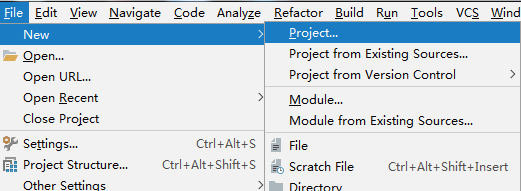
..
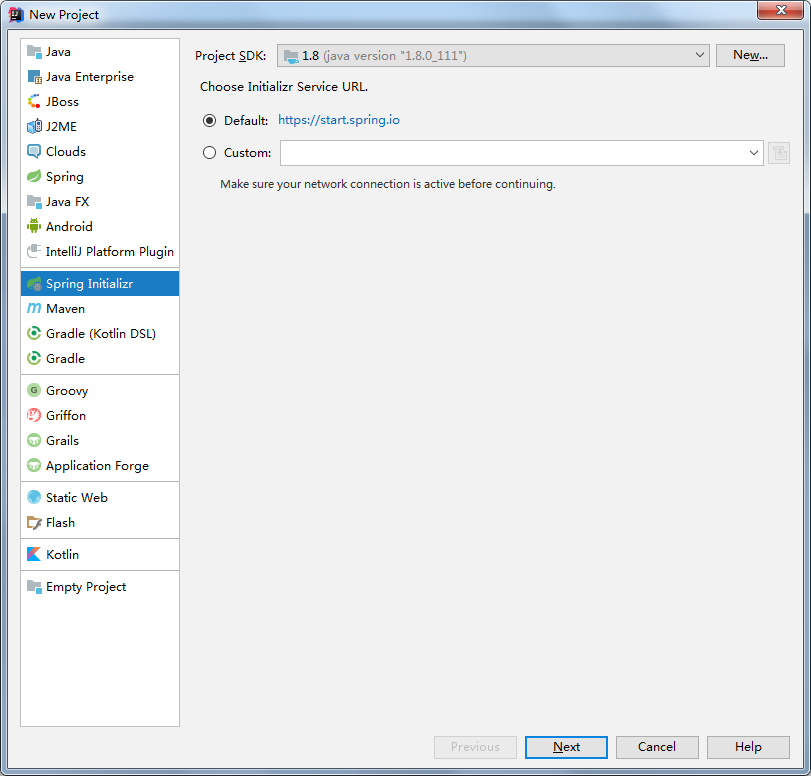
..
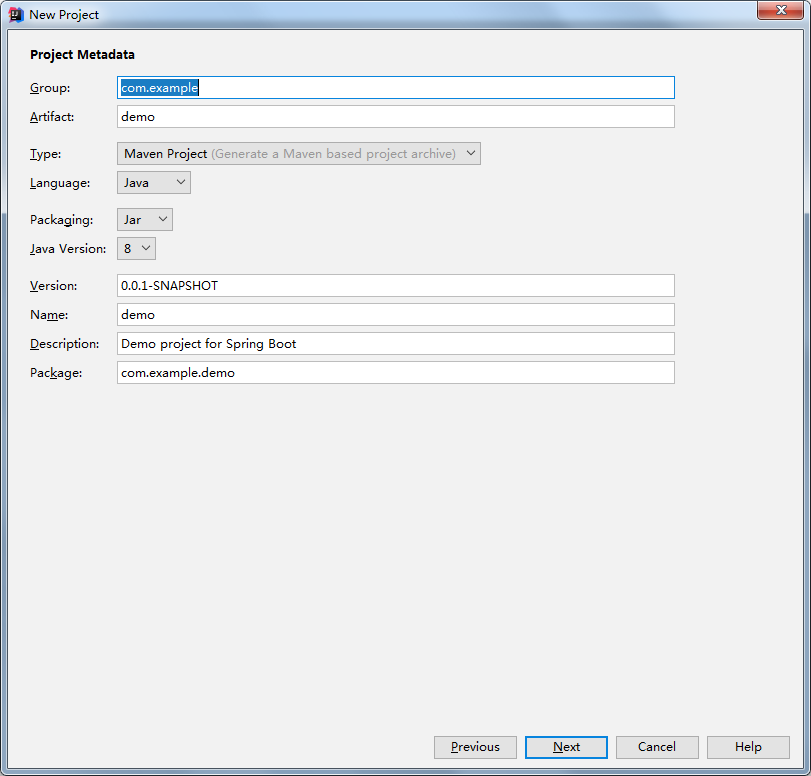
..选择redis
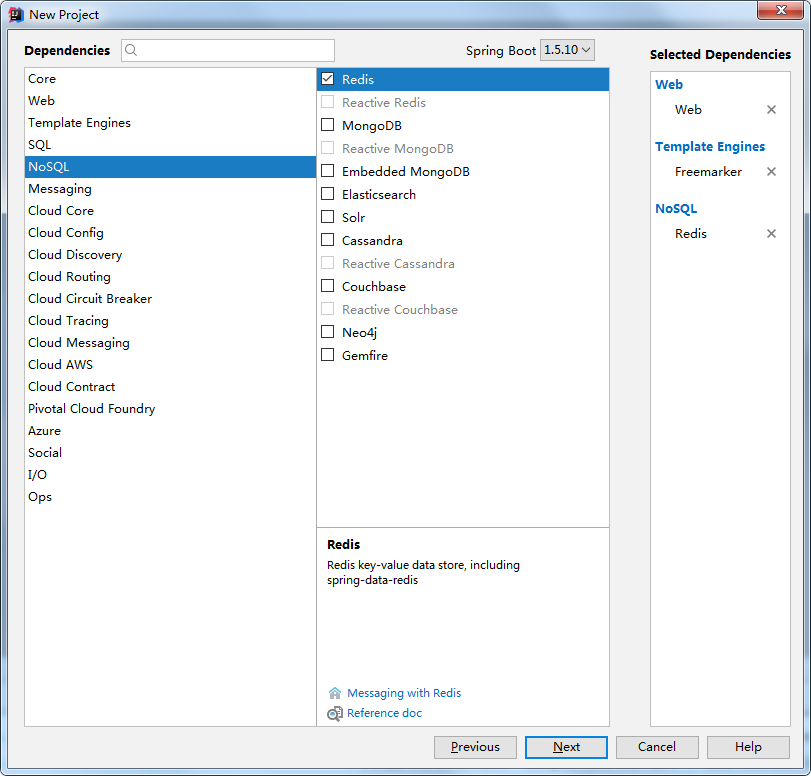
..

点击Finish
先看一下最终目录
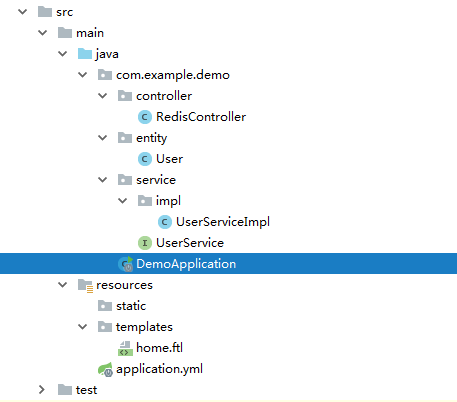
下面建立文件
pom文件不用改
..
新建一个entity包,在包下建立User类
package com.example.demo.entity; import java.io.Serializable; public class User implements Serializable { private String id; private String name; private double salary; public User() { } public User(String id, String name, double salary) { this.id = id; this.name = name; this.salary = salary; } public String getId() { return id; } public void setId(String id) { this.id = id; } public String getName() { return name; } public void setName(String name) { this.name = name; } public double getSalary() { return salary; } public void setSalary(double salary) { this.salary = salary; } @Override public String toString() { return "User{" + "id=" + id + ", name='" + name + '\'' + ", salary=" + salary + '}'; } }
新建一个service包,包下建立UserService类
package com.example.demo.service; import com.example.demo.entity.User; import org.springframework.stereotype.Service; import java.util.List; @Service public interface UserService { int addUser(User user); List<User> getUsers(); int addString(String key, String value); String getString(String key); }
在service包下建立impl包,包下建立UserServiceImpl类
package com.example.demo.service.impl; import com.example.demo.entity.User; import com.example.demo.service.UserService; import org.springframework.beans.factory.annotation.Autowired; import org.springframework.data.redis.core.RedisTemplate; import org.springframework.data.redis.core.StringRedisTemplate; import org.springframework.stereotype.Service; import java.util.ArrayList; import java.util.List; @Service public class UserServiceImpl implements UserService { @Autowired private RedisTemplate<String, User> redisTemplate; @Autowired private StringRedisTemplate stringRedisTemplate; @Override public int addUser(User user) { redisTemplate.boundHashOps("users").put(user.getId(), user); return 1; } @Override public List<User> getUsers() { List<User> users = new ArrayList<>(); List<Object> list = redisTemplate.boundHashOps("users").values(); list.forEach(u -> { System.out.println(u); users.add((User) u); }); return users; } @Override public int addString(String key, String value) { stringRedisTemplate.boundValueOps(key).set(value); return 1; } @Override public String getString(String key) { return stringRedisTemplate.boundValueOps(key).get(); } }
这里使用了两种redis模板。
新建一个controller包,包下建立RedisController类
package com.example.demo.controller; import com.example.demo.entity.User; import com.example.demo.service.UserService; import org.springframework.beans.factory.annotation.Autowired; import org.springframework.web.bind.annotation.RequestMapping; import org.springframework.web.bind.annotation.RestController; import org.springframework.web.servlet.ModelAndView; import java.util.List; @RestController public class RedisController { @Autowired private UserService userService; @RequestMapping("/addUser") public String a(){ // userService.addUser(new User("1","Tom", 1000.2)); // userService.addUser(new User("2","Tony", 3000.5)); // userService.addUser(new User("3","Mary", 6224.6)); userService.addUser(new User("4","小明", 2000.2)); userService.addUser(new User("5","小红", 3800.5)); userService.addUser(new User("6","小刚", 9224.6)); return "1"; } @RequestMapping("/users") public List<User> b(){ return userService.getUsers(); } @RequestMapping("/addString") public String c(){ userService.addString("s","string-字符串"); return "1"; } @RequestMapping("/string") public String d(){ return userService.getString("s"); } @RequestMapping(value="/view",produces = {"text/html"}) public ModelAndView e(){ ModelAndView mv = new ModelAndView("home"); mv.addObject("userList",userService.getUsers()); return mv; } }
修改application.yml文件
spring: redis: host: localhost port: 6379 pool: max-active: 8 max-idle: 8 min-idle: 0 max-wait: -1 freemarker: suffix: .ftl charset: UTF-8 content-type: text/html template-loader-path: classpath:/templates/
新建home.ftl文件
<!DOCTYPE html> <html lang="en"> <head> <meta charset="UTF-8"> <title>$Title$</title> </head> <body> <table> <thead> <tr> <th>ID</th> <th>Name</th> <th>Salary</th> </tr> </thead> <tbody> <#list userList as u> <tr> <td>${u.id}</td> <td>${u.name}</td> <td>${u.salary}</td> </tr> </#list> </tbody> </table> </body> </html>
最后,修改启动类,加入RedisTemplate配置【注意,你不配置的话,会提示找不到】
package com.example.demo; import com.example.demo.entity.User; import org.springframework.boot.SpringApplication; import org.springframework.boot.autoconfigure.SpringBootApplication; import org.springframework.context.annotation.Bean; import org.springframework.data.redis.connection.RedisConnectionFactory; import org.springframework.data.redis.core.RedisTemplate; import org.springframework.data.redis.serializer.Jackson2JsonRedisSerializer; import org.springframework.data.redis.serializer.JdkSerializationRedisSerializer; import org.springframework.data.redis.serializer.StringRedisSerializer; @SpringBootApplication public class DemoApplication { public static void main(String[] args) { SpringApplication.run(DemoApplication.class, args); } @Bean public RedisTemplate<String, User> redisTemplate(RedisConnectionFactory redisConnectionFactory){ RedisTemplate<String, User> redisTemplate = new RedisTemplate<>(); redisTemplate.setConnectionFactory(redisConnectionFactory); redisTemplate.setKeySerializer(new StringRedisSerializer()); redisTemplate.setHashKeySerializer(new StringRedisSerializer()); //redisTemplate.setHashValueSerializer(new JdkSerializationRedisSerializer()); // 会有\xac\xed乱码 redisTemplate.setHashValueSerializer(new Jackson2JsonRedisSerializer<User>(User.class)); // 序列化成JSON字符串,无乱码。如果不确定类型,也可以Object.class return redisTemplate; } }
测试
先用 JdkSerializationRedisSerializer 。
运行启动类,在浏览器输入http://localhost:8080/addUser,先去检查redis是否有数据。
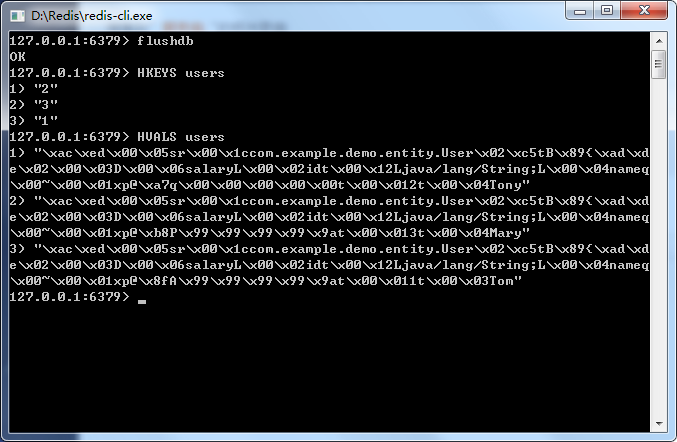
可以看到乱码的出现。但是并不影响读取(反序列化),输入http://localhost:8080/users

有人不喜欢这些乱码,那么去修改配置,打开 Jackson2JsonRedisSerializer的注释
重新访问http://localhost:8080/addUser,查看数据库

这下是标准的json字符串
输入 http://localhost:8080/users

如果是中文呢?你可以看到我有6个测试数据,下面三个是中文的。
执行之后:

浏览器访问:http://localhost:8080/view
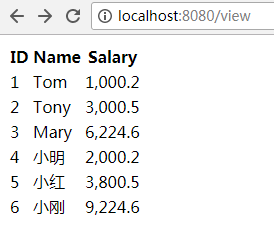
对于 StringRedisTemplate
浏览器输入:http://localhost:8080/addString
再访问:http://localhost:8080/string

小LUA
面对敌人的严刑逼供,我一个字也没说,而是一五一十写了下来。

